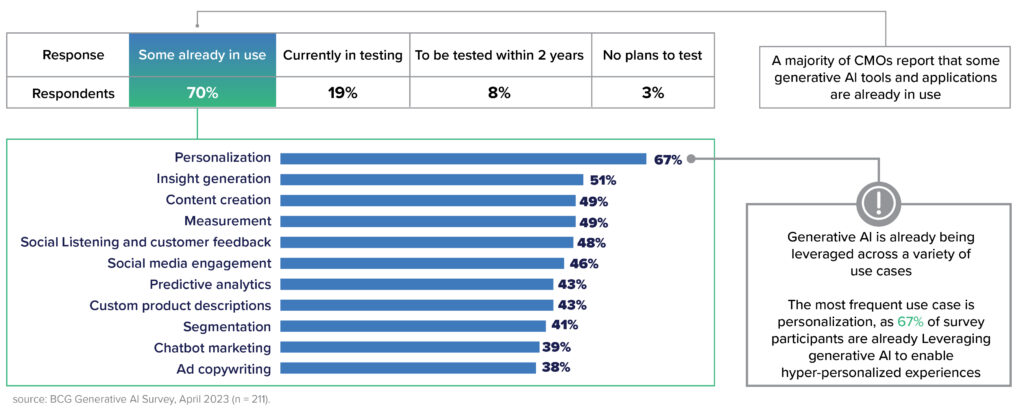Explore the transformative power of Web 3.0 and Generative AI in revolutionizing marketing strategies. Discover how these technologies reshape digital ads.
Picture a realm where marketing strategies transcend mere data and become 'living,' adapting with every consumer interaction. This is the current landscape, thanks to the merging of Web 3.0 and Generative AI, revolutionizing marketing as we know it.
McKinsey Global Institute projected that AI could generate $2.6 trillion - $4.4 trillion in incremental economic impact by solving Web3 marketing problems in the next three years alone. Salesforce also reports that nearly three-quarters of marketers expect generative AI to liberate them from routine tasks, enabling a focus on strategic initiatives, saving an equivalent of over a month's work each year.
This evolution signals an era where artificial intelligence, blockchain, and decentralized data structures are not only enhancing but also revolutionizing how businesses engage with their customers.

Web 3.0 Essentials: Key Features and Technologies Defining Web 3.0
The entry of Web 3.0 marked a change, where the internet is evolving into an intelligent, interconnected web of endless possibilities. Data is no longer just stored; it is also analyzed, understood, and interpreted. Data is dynamic to the extent that it shapes itself to the needs and contexts of its users.
- Semantic Web: Like the human brain, the Semantic Web allows the internet to understand and interpret the context and the subtle nuances of language. It can grasp the heart of content to enable a more intelligent and relevant search experience. Translation - digital-savvy brands can anticipate and cater to the specific needs of users, offering information that is accurate and also contextually rich.
- Artificial Intelligence (AI): Artificial intelligence (AI) in Web 3.0 is at the core of what drives this digital transformation. By integrating AI with natural language processing, Web 3.0 goes beyond traditional norms of data interpretation – it can understand, make sense of data, and make predictions.
- Decentralization: A departure from the centralized silos of Web 2.0, Web 3.0 is built on the robust foundations of blockchain technology, such that it champions a transparent and democratized digital space. Web 3.0 values a world where data ownership is redistributed, and users have full control and security over their digital identities and assets.
Generative AI in Marketing and its Applications
Generative AI is a type of artificial intelligence. It employs algorithms that can create new content - from textual articles and digital images to music and beyond. 51% of marketers are already using or experimenting with generative AI, with another 22% planning to use it soon. Here are Gen AI’s top applications in marketing -
- Content Generation: From blog posts and social media updates to product descriptions and more, it leads to significant time savings and allows for content production at scale. 76% of marketers are already using generative AI for basic content creation and writing copy.
- Personalization: AI can analyze vast data sets to tailor content to individual users based on their behaviors, preferences, and previous interactions. This enhances user engagement and conversion rates.
- Data analysis: It interprets complex data sets to draw meaningful insights and predict consumer behavior, to guide the more effective marketing strategies. About 63% of marketers use generative AI for analyzing market data.
- Design: Beyond text-based content, generative AI creates visual content – think banner ads, social media creatives, infographics, and website templates. This speeds up the design process and can facilitate deeper A/B testing for campaigns, websites, and apps.
- Customer Interactions: AI can handle a large number of customer inquiries via chatbots, social media, and phone calls, and provide instant, personalized responses. This improves the customer experience while allowing for focus on complex tasks. 70% of CMOs already use generative AI, with over 90% reporting a positive impact, including productivity gains as high as 30%.

Transformative Strategies
Unlocking the power of Generative AI by blending with Web 3.0 is a game changer for any business. This fusion brings to the table new strategies that are reshaping the marketing landscape:
- Personalization at Scale: A marketing world where every message, campaign, and digital experience is tailored to the individual preferences of each customer is no longer utopian. AI-driven analytics make enhanced customer engagement and deep loyalty possible through hyper-personalization. 76% of marketers using generative AI are applying it to create personalized content.
- Decentralization of Data: Web 3.0 is catalyzing a movement towards decentralized data management, promising a more secure and transparent handling of customer data. In a world where data privacy concerns are looming, decentralization gives customers control over their data, building a foundation of trust in digital interactions across points of sale.
- Enhanced Creative Potential: Generative AI is enabling the creation of unique and compelling content that resonates with a diverse audience. This allows brands to explore new and more impactful ways to connect with their target audiences.
Domino's introduced a voice ordering system through its virtual assistant, "Dom". Customers could place orders using voice commands on smartphones and smart home systems.
Results: The voice ordering system simplified the ordering process, thereby enhancing customer experience while optimizing operational efficiencies.
Domino's recognized the benefits of voice search and voice-activated devices, integrating it with its digital marketing tools to create a seamless multi-channel ordering experience.
Decentraland, a virtual reality platform, offered limited parcels of virtual land for sale using blockchain technology.
The campaign drew in early adopters and investors interested in the metaverse, creating significant buzz in the market.
Nike used AI-powered marketing to launch personalized shoe designs, by analyzing customer data from app usage patterns, social media behaviors, and purchase history.
Results: The campaign led to an increase in customer engagement, sales, and retention rates, significantly boosting brand loyalty and revenue.
Challenges and Considerations
While Web 3.0 and Generative AI offer immense potential, they also bring challenges:
- Data Privacy and Security: While essential in a decentralized environment, they are complex due to the reliance on centralized platforms in Web 3.0 systems.
- Ethical Implications: Concerns about the ethical use of AI, particularly in content creation, raise questions about bias, accuracy, and the legality needed for responsible AI.
- Scalability and Interoperability: Blockchain networks face the challenge of matching the transaction capabilities of centralized systems. Interoperability between different blockchain networks is also a challenge to overcome.
- Development and Accessibility: The diversity of blockchain networks requires specific and complex developer skills. Web 3.0 projects also have to overcome balancing security with user-friendly interfaces.
Future Trends: Predictions for the Marketing Landscape
Many trends are likely to shape the future of digital marketing at the intersection of AI and Web 3.0. Here are a few top ones.
- High-Quality Content Beyond Text: Recent advancements in Gen AI for producing text, visuals, and video content, and the integration of AI tools like ChatGPT and DALL-E into marketing strategies are transforming content creation, offering richer and more engaging content across formats, channels, and platforms.
- Investments: Significant investments in AI technologies, such as Microsoft's collaboration with OpenAI and Amazon's $4 billion bet on Anthropic, indicate a strong future trajectory for AI in marketing.
- Innovation: The dawn of Web 3.0 is expected to revolutionize digital marketing strategies, placing importance on transparency and honesty in customer data collection while enhancing brand credibility.
- User-generated Content: With the control of content increasingly in the hands of users, there is more space now than ever for users to advocate and share brand-related content across various platforms.
- Smart Contracts and AI in Campaigns: The combination of Web 3.0 and smart contracts is set to remove advertisement intermediaries, paving the way for more direct and automated campaign creation using AI.

How Aionomy can help you?
At Aionomy, we're passionately riding the wave of these groundbreaking technological advancements. Armed with expertise in AI-powered digital marketing and nuanced AI-driven customer journey mapping, we guide businesses through the ever-evolving terrain of Web 3.0 and Generative AI. We're your partners in navigating this new digital frontier, ensuring you harness the full potential of these technologies.
In Closing
It's not a fleeting trend. Integrating Web 3.0 and Generative AI in marketing is a fundamental shift set to redefine the digital landscape. Businesses that embrace these technologies – earlier the better - through services like those offered by Aionomy are poised to experience unprecedented growth and success in the digital age.
